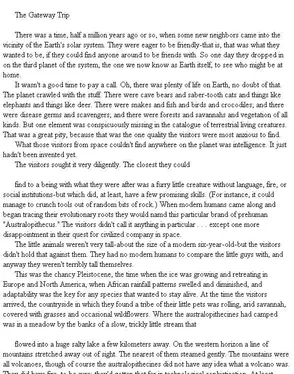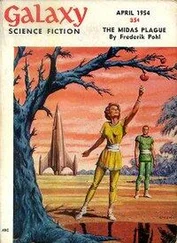Pohl, Frederik - The Gateway Trip
Здесь есть возможность читать онлайн «Pohl, Frederik - The Gateway Trip» весь текст электронной книги совершенно бесплатно (целиком полную версию без сокращений). В некоторых случаях можно слушать аудио, скачать через торрент в формате fb2 и присутствует краткое содержание. Жанр: Старинная литература, на английском языке. Описание произведения, (предисловие) а так же отзывы посетителей доступны на портале библиотеки ЛибКат.
- Название:The Gateway Trip
- Автор:
- Жанр:
- Год:неизвестен
- ISBN:нет данных
- Рейтинг книги:4 / 5. Голосов: 1
-
Избранное:Добавить в избранное
- Отзывы:
-
Ваша оценка:
- 80
- 1
- 2
- 3
- 4
- 5
The Gateway Trip: краткое содержание, описание и аннотация
Предлагаем к чтению аннотацию, описание, краткое содержание или предисловие (зависит от того, что написал сам автор книги «The Gateway Trip»). Если вы не нашли необходимую информацию о книге — напишите в комментариях, мы постараемся отыскать её.
The Gateway Trip — читать онлайн бесплатно полную книгу (весь текст) целиком
Ниже представлен текст книги, разбитый по страницам. Система сохранения места последней прочитанной страницы, позволяет с удобством читать онлайн бесплатно книгу «The Gateway Trip», без необходимости каждый раз заново искать на чём Вы остановились. Поставьте закладку, и сможете в любой момент перейти на страницу, на которой закончили чтение.
Интервал:
Закладка:
And when a black hole passes in front of, say, a globular cluster,
it doesn't hide the cluster. It simply bends the cluster's light around
it.
If Victory's crew had wasted seven days, they still had five days' worth of supplies left before they had to start back to Gateway. They used them all. They took readings on the black hole even when they couldn't see it ... and when at last they got back to Gateway they found that one, just one, of their pictures had paid off.
They shared a five-hundred-thousand-dollar bonus simply for the pictures of the globular cluster. But the one picture that they hadn't even noticed when they took it-a split-second frame, taken automatically when no one happened to be watching the screen-showed what happened when the black hole occluded a bright B-4 star, a few hundred light-years away. That star hadn't moved up or down. By chance it had passed almost exactly behind the black hole. Its light had spread to surround the hole, like a halo; and that gave them a measure of the hole's size .
And then, long after they were back in Gateway, the research teams that studied their results awarded them another half a million, and the information that they were very lucky.
Marianna Morse had wondered about that: Why had the Heechee used an armored Five to visit this harmless object? Answer: It hadn't always been harmless.
Most black holes are not safe to visit. They pull in gases in accretion rings, and the acceleration of the gases as they fall produces a hell of radiation. Once this one had, but that was a long time ago. Now it had eaten all the gases in its neighborhood. There was nothing left to fall and so generate the synchrotron flux of energy that might fry even an armored Five if it lingered too long nearby .
and so the crew of Victory, without knowing it at the time, had had an unexpected stroke of luck. They arrived at the neighborhood of their black hole after its lethal feeding frenzy had ended, and so they had come back alive.
In its first twenty years the Gateway Corporation handed out more than two hundred astronomical science bonuses, for a total of nearly one billion dollars. It paid off on double stars and supernova shells; it paid off on at least the first examples of every type of star there was.
There are nine members of the catalogue of star types, and they are easily remembered by the mnemonic "Pretty Woman, Oh, Be A Fine Girl, Kiss Me," which runs the gamut from youngest to longest-living stars. The stellar classes from A down to the dim, small, cool Ms didn't earn any special science bonuses unless there was something truly remarkable about them, because they were too common. The vast majority of stars were dim, small, and cool. Contrariwise, the Os and Bs were hot young stars, and they always got bonuses because they were so few. But the Gateway Corporation awarded double bonuses on the P and W classes: P for gas clouds just condensing into stars, W for the hot, frightening Wolf-Rayet type. These were new stars, often immense ones, that could not be approached safely within billions of miles.
All those lucky prospectors collected science bonuses. So did the ones who happened to find themselves near known objects, at
least if they were the first to claim the rewards. Wolfgang Arretov was the first to arrive near the Sirius system, and Earthly astronomers were delighted. The stars Sirius A and B ("Bessel's satellite") had been studied intensively for centuries, because the primary star is so bright in Earthly skies. Arretov's data confirmed their deductions: Sirius A at 2.3 solar masses, B only about one-but a white dwarf with a surface temperature over twenty thousand degrees. Arretov got half a million for letting the astronomers know they had been right all along. Later, Sally Kissendorf got a hundred thousand for the first good pictures of the tiny (well-three solar masses, which is not real tiny; but just about invisible next to its huge primary) companion of Zeta Aurigae. She would have gotten more if the companion had happened to flare while she was nearby, but that might not have been worth her while, since it was very likely she could not have survived the experience. Matt Polofsky's picture of little Cygnus A only got him fifty thousand dollars, though-red dwarf stars simply weren't that interesting. Even well-studied nearby ones. And Rachel Morgenstern, with her husband and their three grown children, shared half a million for the Delta Cepheid shots. Cepheids aren't all that rare, but the Morgensterns happened to be there just when the star's surface layers were losing transparency through compression.
And then there were all the missions that wound .up in Oort clouds.
Oort clouds are masses of comets that orbit a star very far out-the Oort in Earth's system doesn't get going until you're half a light-year from the Sun. There are lots of comets in your average Oort cloud. Trillions of them. They generally mass as much as the aggregate of a star's planets, and almost every star has an Oort.
They seemed to fascinate the Heechee.
In Gateway's first twenty years of operation, no fewer than eighty-five missions wound up in an Oort cloud and returned to tell of it.
That was a big disappointment to the prospectors involved, be-
cause the Gateway Corporation stopped paying bonuses for Oort data after the tenth such mission. So those prospectors who came back from an Oort complained a lot. They couldn't understand why the Heechee had targeted so many missions to the dumb things.
And, naturally, they had no idea how lucky they really were, because it was a long time before anyone found out that, for an astonishing reason, most Oort missions never got back to the Gateway asteroid at all.
That billion dollars in astronomical science bonuses was welcome enough to the prospectors who got a share of it. But, really, it was chicken feed. What the Gateway Corporation was formed for was profit. The prospectors had come to the asteroid for the same reason, and big profit didn't come from taking instrument readings on something millions of miles away. The big bucks came from finding a planet, and landing on it-and bringing back something that made money.
Neither the Gateway Corporation nor the individual prospectors had much choice about that. Making a profit was the basic rule of survival, and neither the prospectors nor the Corporation made the rules. Those rules were made by the nature of the world they came from.
Homo sapiens evolved on the planet Earth, and the process of evolution made it certain that every human trait was custom-engineered to fit Earth's conditions, like a key in a lock. With three billioh years of Darwinian selection to make the fit perfect, life on Earth should have been pretty nearly heaven for its human inhabitants.
It wasn't. Not anymore, for rich Earth was getting close to filing for bankruptcy. It had spent its wealth.
Oh, there were many millionaires on Earth. Billionaires, too; people with more money than they could spend, enough to hire a hundred servants, enough to own a county for a backyard, enough to pay for Full Medical insurance coverage, so that for all their long lives they would have at their command the most wonderful of all the wonderful medical, pharmaceutical, and surgical techniques to keep them healthy, and to make those lives very long. There were hundreds of thousands of the very rich, and many millions of the more or less well to do . .
But there were ten billion others.
There were the ones who scratched out a living by farming on
Asian plains and African savannahs; they made a crop when rain fell and wars stayed away and marauding insect pests devoured some other countryside than their own, and when the crop failed they died. There were the ones who lived in the barricaded slums of the big cities (the word "ghetto" was no longer a metaphor), or the barrios outside Latin metropolises, or the teeming warrens of the urban areas of the Orient. These people worked when they could. They lived on charity when there was any charity to be had. They lived at the bottom of the food chain-rice and beans, yams and barley; or, if they had the money to pay for it, single-cell proteins from the fossil-fuel conversions of the food mines-and they were very likely to be hungry throughout every hour of every day of their lives. Which were short. The poor people couldn't afford the medical plans. If they were very lucky there might be a free clinic, or a cheap doctor, to hand out pills and take out an appendix. But when one of their organs wore out they had only two alternatives. They managed to get along without it; or they died. The poor people could never afford organ transplants. They were lucky if they weren't caught in a dark alley some night and themselves converted into transplants for some richer person, by some more desperate one.
Читать дальшеИнтервал:
Закладка:
Похожие книги на «The Gateway Trip»
Представляем Вашему вниманию похожие книги на «The Gateway Trip» списком для выбора. Мы отобрали схожую по названию и смыслу литературу в надежде предоставить читателям больше вариантов отыскать новые, интересные, ещё непрочитанные произведения.
Обсуждение, отзывы о книге «The Gateway Trip» и просто собственные мнения читателей. Оставьте ваши комментарии, напишите, что Вы думаете о произведении, его смысле или главных героях. Укажите что конкретно понравилось, а что нет, и почему Вы так считаете.












